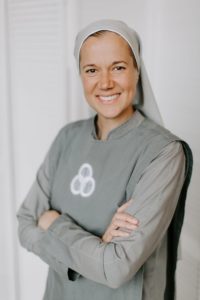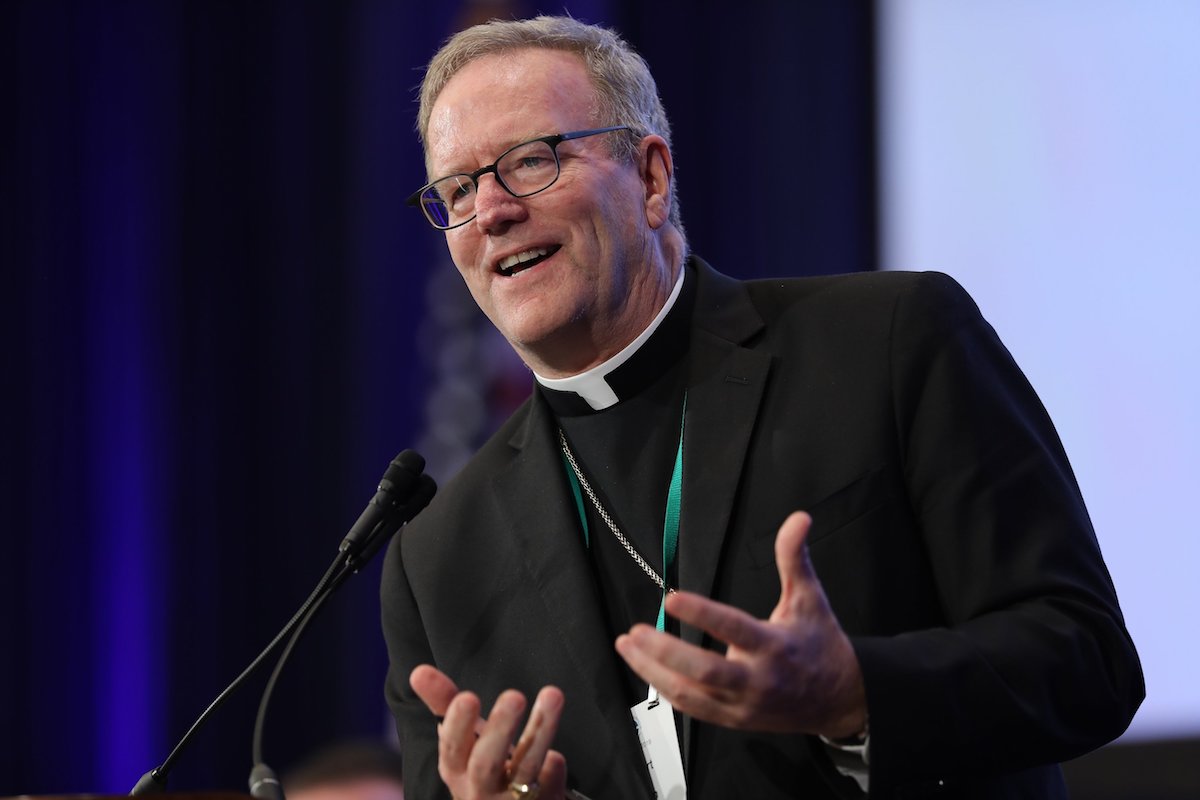ORLANDO, Fla. (CNS) — A bishop and a religious sister who shared the keynote spotlight on the opening night of SEEK21, this year’s national conference of the Fellowship of Catholic University Students, discussed their own faith journeys and how Catholics from around the world can improve their faith by accepting Jesus’ divine character.
SEEK21 drew over 27,000 participants for its virtual events Feb. 4-7 and included college students, missionaries, FOCUS alumni, parishioners, young adults, FOCUS benefactors, clergy, religious and others.
Speaking from Texas, Sister Miriam James Heidland, a member of the Society of Our Lady of the Most Holy Trinity, began the first half of the keynote address on “Who Am I?” with a story of her own.
Observing a homeless man under an overpass one day, she had pondered the life of the man and what had brought him to that situation.
“That young man, he just found a place in my heart,” Sister Heidland said, wondering which choices led the man there. She used this example to bring light to the Catholics watching her now by asking, “How did you get here? Mentally, emotionally, spiritually, physically. So often in life we end up places and we have no idea how we got there,” which eventually leads to the bigger question, “Who am I?”
She encouraged the viewers to seek out this answer with Christ. “Christ is such a great teacher because what he does is actually teach by asking questions. He elicits the answers from us perhaps even when we don’t know what they are ourselves.”
Searching oneself for the answer is the key, Sister Heidland added. “There is something (special) about an answer that comes from deep within. … It’s only when we find him, when we continue to turn our face to him that we find out not just who he is but who we are.”
“It’s such a glorious thing,” she said of human life. “We are made to know and to love. We have an intellect and a will. We can perceive what is good and we can choose what is good and we can travel along that path. That our emotions power us ideally when they are healed to what is good, true, and beautiful, to our deepest desires. To the reveal the deepest questions that we have.”
“He welcomes you and I,” Sister Heidland said. “And he delights to answer that question in various forms every single day of who am I? How did I get here? Because we are asking that question constantly.” Asking those questions is natural and common every day, she said.
“We all take that question all the time and we offer it to other people. And because everybody has a different experience of us and a different experience of their own lives, they all have various answers. And none of them are complete and thank God for it,” she said. “Anybody who loves us authentically can reveal just one part of God’s love for us. It is only God himself who can see us according to the whole, who sees us fully.”

“How did you get here in your masculinity as a man and your femininity as a woman?” Sister Heidland asked. “What is that story because it is a glorious story being told. The Lord desires to take all of it into himself and to unite it to his heart and to give him the gift of himself so you and I know who we are.”
She referenced the possibility of venturing down negative paths when Catholics forget who they are. “When we forget who we are we are easily led astray. We easily fall into cancel culture and outrage. In my heart, I don’t believe for a second that is what we really want.”
She concluded her speech with a prayer, asking Christ for guidance:
“Jesus I pray that for each one of us you would open our hearts. … I pray that your attentive, kind, tender love will just melt any areas of resistance. I want to invite you my friends just to picture Christ in front of you, however he reveals himself to you … ask him ‘Jesus, who do you say that I am? Who am I?’ … What do you want us to know about your love for us and who we are in your sight? … We surrender our hearts to you. We surrender this conference to you. We surrender every moment to you. And we pray to encounter you Lord so that we know who you are and that we know who we are.”
Los Angeles Auxiliary Bishop Robert E. Barron, founder of Word on Fire Catholic Ministries, spoke to viewers from Los Angeles about the character of Jesus. “There is nothing I would rather talk to you about than Jesus,” Bishop Baron said. “He’s everything. He’s the alpha and omega.”
“In the singularity of his person, he is the coming together of divinity and humanity. … Jesus is the fulfillment and culmination of all the great institutions of Israel,” he explained. “Think of temple, think of prophecy, think of Torah, think of law, covenant. All that was designed to bring divinity and humanity together, to reconcile God and his people.”
This identity of Jesus is “why we say he is our salvation … our salvation depends on the coming together of divinity and humanity,” he said, noting that Catholics cannot be saved by one and not the other.
“What’s the warrant for claiming the divinity of Jesus?” Bishop Barron asked. “Jesus speaks and acts in the very person of the God of Israel, which makes his qualitatively different than any of the other ‘sent’ figures who came before him.”
Referencing the Gospel of Matthew, Bishop Barron quoted: “Heaven and earth shall pass away, but my words shall never pass away. … Unless you love me more than your mother and father, more than your own life, you are not worthy of me.” The emphasis here is that Jesus is “the eternal word … the highest good” and a complete representation of divinity and humanity, he said.
“We can understand the famously weird question that Jesus poses: ‘Who do the crowds say that I am?'” Bishop Barron said. “It makes the point that the Gospels are not first and foremost interested in the moral teaching of Jesus. They are interested in who he is?”
He added: “This means that Jesus compels a choice, a decision in a way that no other religious founder or figure does.” It this choice that defines a Catholic’s devotion to Christ as an authentic voice of God, noting what a choice opposing Jesus would mean, “if he is not who he says he is than is not a good person, not an inspiring ethical teacher, he’s a bad man … you have to make a decision. The Gospels compel it. And doesn’t Jesus himself say it, ‘You’re either with me or you’re against me.'”
Discussing the humanity of Christ, Bishop Barron said, “The two natures of Jesus come together without mixing, mingling or confusion. In other words, God’s coming close does not result in the suppression or eradication of Jesus’ humanity, but in the enhancement and elevation of it. … Look at the claim of Christianity that God in Christ comes close but does not overwhelm the humanity to which he comes close,” immediately comparing Jesus’ closeness to the forever burning bush.
“As God comes close to a creature, the creature’s beauty and integrity is enhanced, not overwhelmed. So we say Jesus is true God and true man.”
“There is no philosophy, ancient or modern, that proposes a greater humanism than Christianity,” Bishop Barron said. “We claim the divinization of our humanity … is raised up, enhanced, rendered more beautiful and radiant by the presence of God.”
In closing, Bishop Barron had encouraging words for Catholics against any oppressing situations of current times.
“Go forth with this incarnational confidence that it’s when you proclaim the divinity of Jesus that you are also by the same token proclaiming the greatest possible humanism. … Don’t be ashamed of Jesus, everybody,” he said. “Proclaim Jesus with divine and human with confidence, with joy, with panache, and you will find your missionary vocation fulfilled.”







